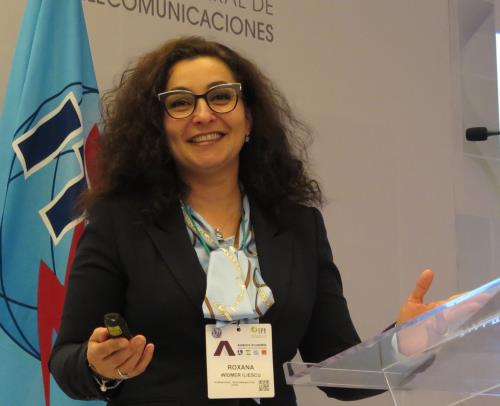Capacity Building and Enabling Environments for Meaningful Access in Indigenous and Rural Communities
ITU-D Digital Inclusion, Rhizomatica Communications and Association for Progressive Communications (APC)
Session 383
The objective of this session is to dialogue around the impact of the capacity building programmes aimed at enabling people living in rural territories or indigenous communities to deploy, operate and manage their own solutions for meaningful access and local ICTs entrepreneurship. Likewise, at the end of the dialogue space, there will be inputs to understand how different stakeholders can develop enabling environments to make these local solutions and training programs sustainable. This will be achieved through the sharing of experiences in the development of two capacity building initiatives in the global south: The training program for community technicians in indigenous communities in Latin America promoted by ITU and Techio Comunitario, and the first National Schools of Community Networks carried out in Kenya, South Africa, Nigeria, Indonesia and Brazil, promoted by APC and Rhizomatica.



-
 C2. Information and communication infrastructure
C2. Information and communication infrastructure
-
 C4. Capacity building
C4. Capacity building
-
 C6. Enabling environment
C6. Enabling environment
-
 C8. Cultural diversity and identity, linguistic diversity and local content
C8. Cultural diversity and identity, linguistic diversity and local content
C2: Through these training programmes it is possible to generate sustainable infrastructure solutions in the last mile, since it is the organizations themselves who take charge of it.
C4: By participating in these programmes, community leaders and communicators gain skills that are socialized in their territories and generate local training processes. Ultimately, this translates into digital literacy actions and access to ICTs for people with very different characteristics who live in rural and indigenous territories.
C6: Various stakeholders participate in the design and implementation of these programmes, as they are developed collectively. This happens, for example, by integrating them as advisory committees or in the delivery of the modules. This gradually contributes to generate the necessary linkage and advocacy instances for the creation and consolidation of these local initiatives for meaningful access and the training programmes that support them.
C8: These training programmes are based on cultural diversity and respond to it through their learning methodologies anchored in the contexts and ways of sharing knowledge of the communities in which they are developed. Also, the technology is understood from the needs of the communities and it adapts to them. Furthermore, the projects developed by the participants are closely linked to the production of local content. Finally, the diversity in these programmes is a consequence of the diversity of the communities themselves, more women are participating in the technical training programmes and people of very different ages have been included.
-
 Goal 1: End poverty in all its forms everywhere
Goal 1: End poverty in all its forms everywhere
-
 Goal 4: Ensure inclusive and equitable quality education and promote lifelong learning opportunities for all
Goal 4: Ensure inclusive and equitable quality education and promote lifelong learning opportunities for all
-
 Goal 9: Build resilient infrastructure, promote sustainable industrialization and foster innovation
Goal 9: Build resilient infrastructure, promote sustainable industrialization and foster innovation
-
 Goal 17: Revitalize the global partnership for sustainable development
Goal 17: Revitalize the global partnership for sustainable development
Firstly, it addresses objective 1 of ending poverty, as the local meaningful access initiatives, which are strengthened through these training programmes, have a direct impact on the local economy and close the economic, social and cultural gaps that result from the lack of access to ICTs.
Second, Objective 4. Education. The development of local solutions of meaningful access implies the creation of spaces for exchange and training in Internet, ICT and communication from a perspective that addresses the needs and ways of learning of the communities in which they are developed. These training processes are based on the diversity of knowledge and experiences, as well as on local development plans, which in many cases are linked to good living and sustainable development.
On the other hand, Goal 9 on infrastructure, when talking about access to Information and Communication Technologies (ICTs) in less developed countries, the active participation of local communities and the definition of models appropriate to these contexts become important. These programmes enable people in the communities to sustain their own communication networks.
Finally, objective 17 on partnerships to achieve the objectives, in target 17.8, seeks to promote ICT development and capacity building. For partnerships, it is essential to identify communities as key allies and central actors in their own development process.
- Video of the Latin American 2022 programme (Spanish with English subtitles): https://youtu.be/qevgxfq56Gg
- About the National Community Network Schools: https://www.apc.org/en/blog/meet-national-schools-empowering-grassroots-communities-bridge-digital-divide
- Techio Comunitario page (in Spanish): https://techiocomunitario.org/
- CN Learning Repository: https://cnlearning.apc.org/
- ITU Indigenas Page (English):https://www.itu.int/en/ITU-D/Digital-Inclusion/Indigenous-Peoples/Pages/default.aspx
- Guide for the design of training programmes: https://www.apc.org/en/pubs/technological-autonomy-constellation-experiences-guide-collective-creation-and-development